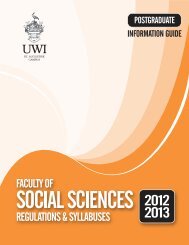Faculty of Humanities and Education (Postgraduate) - The University ...
Faculty of Humanities and Education (Postgraduate) - The University ...
Faculty of Humanities and Education (Postgraduate) - The University ...
Create successful ePaper yourself
Turn your PDF publications into a flip-book with our unique Google optimized e-Paper software.
POSTGRADUATE REGULATIONS & SYLLABUSES 2012 - 2013<br />
THE FACULTY OF HUMANITIES & EDUCATION<br />
YEAR:<br />
SEMESTER:<br />
COURSE CODE: EDRL 6004<br />
COURSE TITLE: INFORMATION AND COMMUNICATIONS<br />
TECHNOLOGY (ICT) FOR READING<br />
NUMBER OF CREDITS: 4<br />
COURSE DESCRIPTION: This course, Information <strong>and</strong><br />
Communication Technology (ICT) for Reading, is essentially about<br />
the selection <strong>and</strong> use <strong>of</strong> a variety <strong>of</strong> technologies to support<br />
reading instruction <strong>and</strong> assessment. Such technologies include<br />
word processors, reading s<strong>of</strong>tware, blogs, podcasts, <strong>and</strong> e-books.<br />
<strong>The</strong>y will be explored through various strategies, including<br />
interactive lectures, pr<strong>of</strong>essional dialogue, h<strong>and</strong>s-on laboratory<br />
activities, <strong>and</strong> demonstrations. <strong>The</strong> purpose <strong>of</strong> the course is to<br />
equip students with the technical <strong>and</strong> pedagogical background<br />
needed to integrate technology that they can then apply <strong>and</strong><br />
extend as they undertake the other courses in the Programme<br />
<strong>and</strong> assume their role as reading pr<strong>of</strong>essionals.<br />
<strong>The</strong> course addresses St<strong>and</strong>ards 2, 3, <strong>and</strong> 4 <strong>of</strong> the International<br />
Reading Association (IRA) St<strong>and</strong>ards for Reading Pr<strong>of</strong>essionals<br />
(2003).<br />
Prior to taking this course, participants must complete two<br />
(Semester 1) courses in reading: <strong>The</strong>oretical Foundations <strong>of</strong><br />
Reading <strong>and</strong> Reading Diagnosis, Intervention, <strong>and</strong> assessment,<br />
both <strong>of</strong> which provide the content basis for the application <strong>of</strong><br />
the technologies in the current course.<br />
Content<br />
<strong>The</strong> course will address the following topics:<br />
• Integrating technology in the reading curriculum<br />
• Using technology to support reading instruction<br />
• Using technology to support assessment <strong>and</strong> pr<strong>of</strong>iling <strong>of</strong><br />
students<br />
• Using technology to capture information about students,<br />
teachers <strong>and</strong> schools<br />
• Using technology for knowledge management<br />
• Communicating about reading through technology.<br />
General Objectives<br />
In order to achieve the course goal, the participants will:<br />
• Select, plan, <strong>and</strong> demonstrate the use <strong>of</strong> ICTs in reading<br />
instructional practices<br />
• Review, use, <strong>and</strong> interpret data from technology-based<br />
reading assessments<br />
• Review <strong>and</strong> select technology-based information on a<br />
variety <strong>of</strong> cultural <strong>and</strong> linguistic situations for application<br />
to their own<br />
• Use ICTs to support their own research as well as<br />
collaborative research with others.<br />
Course Assessment<br />
<strong>The</strong> participants will be assessed on 100% coursework as<br />
outlined below:<br />
Assessment 1 – Electronic Portfolio – 60%<br />
In order to determine whether or not the course objectives are<br />
met, the participants will each submit an electronic portfolio<br />
with seven (7) lesson plans that demonstrate the integration <strong>of</strong>:<br />
word processors, concept mapping s<strong>of</strong>tware, reading s<strong>of</strong>tware,<br />
the internet, ebooks, blogs, podcasts, <strong>and</strong> wikis. <strong>The</strong> lesson<br />
plans need to be developed using sound instructional design<br />
principles <strong>and</strong> should follow the template provided.<br />
Assessment 2 – Web 2.0 in Reading Instruction Paper – 20%<br />
<strong>The</strong>re is a dearth <strong>of</strong> research on how Web 2.0 technologies (blogs,<br />
wikis, <strong>and</strong> podcasts) can be used to support reading instruction.<br />
Although many authors have described their potential, it is <strong>of</strong>ten<br />
in broad terms that may not be useful to Reading Specialists. In<br />
order to fill this gap, each participant will write a thought-paper<br />
exploring how a Web 2.0 technology can be used to support one<br />
<strong>of</strong> the key reading components (decoding, morphology, fluency,<br />
vocabulary, or text comprehension) or reading development<br />
(reading assessment, writing, or motivation). <strong>The</strong> paper should<br />
take account <strong>of</strong> the foundational areas <strong>and</strong> provide detailed<br />
examples <strong>of</strong> instructional strategies.<br />
Assessment 3 – Reading Specialist Blog – 20%<br />
In order to get the participants accustomed to their<br />
responsibilities, over the course <strong>of</strong> the semester they will post<br />
their reflections <strong>and</strong> insights, as well as any news, research, <strong>and</strong><br />
instructional strategies sent from listervs <strong>and</strong> RSS feeds, to their<br />
own Reading Specialist Blog.<br />
Resources<br />
myeLearning (Moodle) – Learning Management System<br />
International Society for Technology in <strong>Education</strong> – http://www.<br />
iste.org/<br />
International Reading Association (2002). Integrating literacy<br />
<strong>and</strong> technology in the curriculum: A position statement <strong>of</strong><br />
the International Reading Association. Retrieved February<br />
22, 2009 from: http://www.reading.org/General/AboutIRA/<br />
PositionStatements/TechnologyPosition.aspx<br />
103

















